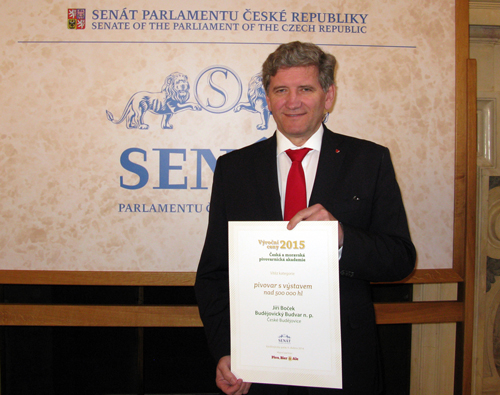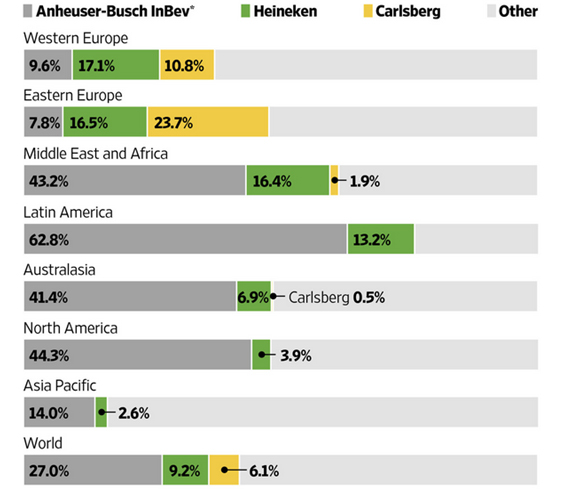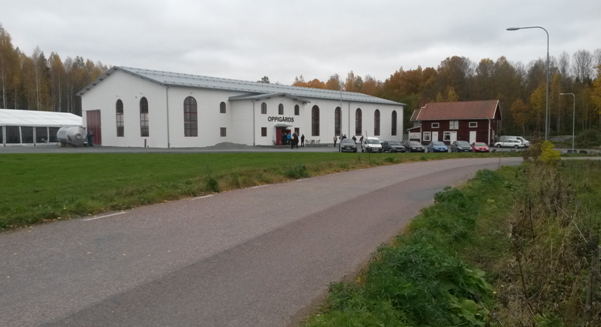On 2 November 2016 the privately-owned Haus Cramer Group, which also owns the Warsteiner brewery, reported the disposal of 12 of its Welcome hotels division to Terra Firma, a private equity firm founded by Guy Hands in 2002. No financial details were disclosed. Mostly targeting business travellers, the Welcome hotels had a turnover of EUR 60 million (USD 67 million) and were slated for a sale in 2015, insiders say.
The sudden resignation of Budweiser Budvar’s long-time General Director Jiri Bocek in early November 2016 due to ill health poses a problem to Budvar’s owner, the Czech Ministry for Agriculture. It has to quickly find a successor to Mr Bocek, 59, who has headed Budweiser Budvar for 25 years and steered it through several battles with US brewer Anheuser-Busch and later AB-InBev.
Why would AB-InBev launch one Leffe spin-off after another, roll out zero alcohol beers and buy brands like Kwak and Ginette? The answer is: to claim more space on the beer shelf for its own brands.
Leadership is also about continuity. Heineken said on 26 October 2016 that it would seek a fourth, four-year term for its CEO Jean-François van Boxmeer, who has led Heineken since 2005 and whose contract was to expire in 2017.
On 1 January 2017, excise on beer could be hiked by 4 percent to reach USD 21.92 per hl. That’s among the highest duty loads in Europe. The association of Swedish craft breweries has voiced its objections to the excise increase, arguing that it will hamper their growth. There are currently nearly 250 small breweries in Sweden, most of them run by enthusiasts who already struggle with unpaid evening and weekend work.
In the village they call the brewery the “beer church” and, by the looks of the building with its arched windows, villagers are not far off the mark. Nor when it comes to size. It’s the largest structure in the village of Ingvallsbenning (50 permanent residents) in central Sweden. No doubt, the delivery trucks will have a fun time reaching the brewery which is 8 km away from the nearest town (Hedemora) and about 180 km from Stockholm.
When releasing its third quarter 2016 results on 28 October 2016, AB-InBev not only reported a surprise drop in profits, but the world’s number one brewer also cut its revenue forecast for the full year, saying it no longer expects sales growth to beat inflation in 2016 because of declining volumes in Brazil.
For the first time ever, in 2015, more beer was sold in supermarkets and off-licences than in Britain’s 145,000 pubs, clubs, hotels and restaurants. According to a recent report by the British Beer and Pub Association (BBPA), of the 44 million hl beer sold, 51 percent found its way to consumers via the off-trade channel. The remaining 49 percent was sold through pubs, clubs and other licensed premises.
It was only a matter of time. With Russian beer consumption in decline for the past eight years, Heineken said on 5 October 2016 that it will suspend production at PIT Company, its affiliate in the Russian city of Kaliningrad, from 1 January 2017. With a population of nearly one million people, Kaliningrad is a Russian enclave by the Baltic Sea lodged between Poland and Lithuania.
How could this happen? Heineken Ireland has claimed that some of its beers have been purposefully mislabelled and sold as fake craft beer in certain pubs in Ireland, fuelling consumer debate over what constitutes a ‘craft’ beer. The scandal broke in September 2016 and has had punters wagging their tongues since.



